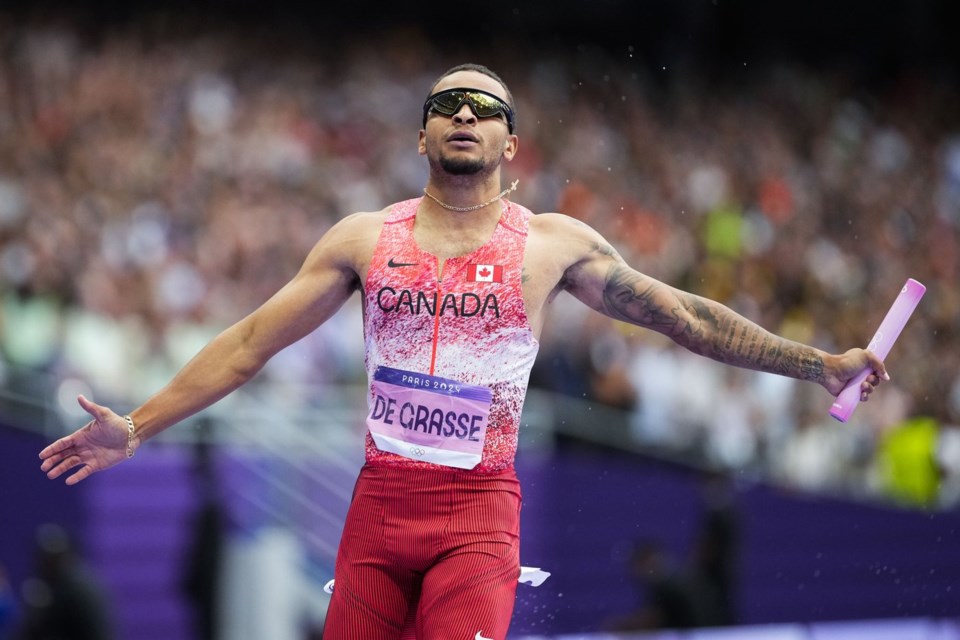Andre De Grasse is enjoying the high of being a gold medallist once again.
The 29-year-old from Markham, Ont., capped off an adversity-filled Olympics in August by anchoring Canada's men's 4x100-metre relay team to gold, a first for Canada since 1996. De Grasse has been in Toronto the last couple of weeks for the Toronto International Film Festival and several other commitments.
"Just feeling the love," he said. "Enjoying the ride, enjoying the highs and just having fun in the process. It's a surreal moment."
The Paris relay medal was De Grasse's seventh, tying him with swimmer Penny Oleksiak as Canada's most decorated summer Olympians.
The City of Markham is honouring him, along with other Olympians and Paralympians who call the city home, with a parade on Sunday. Mayor Frank Scarpitti also proclaimed Aug. 9 to be Andre De Grasse Day.
Picking up medal No. 7, and a second gold, is something De Grasse feels has helped cement his legacy.
"A lot of people, when I came home, weren't even talking about (all the adversity I faced)," De Grasse said. "They were just talking about how, 'we were watching you on TV, it was just incredible how you brought it home for Canada.' We made history.
"Just to get that reception from people, and what was the last thing that crossed their minds and just me being now tied for most decorated in Canada with my good friend Penny. It was just a surreal feeling.
"Now the city that I grew up in is throwing me a parade. I'm just looking forward to that reception. Hopefully I don't get too emotional compared to last time (in 2016)."
De Grasse missed an Olympic final for the first time in his career, failing to make it in both the 100 and 200 in Paris. After missing the 200 final, he revealed that he had re-aggravated a hamstring injury he suffered a month out from the Olympics.
The showing built some skepticism about whether De Grasse may be over the hill. But De Grasse says he looks ahead to making the 2028 Los Angeles Games.
"As long as I have sponsors backing me and believing in me financially and I'm able to keep going, I'm going to go," he said. "I ran my fastest time this year in over three years and I still felt like I wasn't 100 per cent.
"I know if I can get back to that 100 per cent, and not have no nick-nacks, I do everything right, I can still compete at a high level. One of the medallists (American Fred Kerley) in the 100 metres, he's my age, ... so it's not like I feel like I'm old and can't keep going. I feel like my body's still good, I just have to make sure that I do the right things taking care of it."
His coach, Rana Reider, also had his accreditation revoked by the Canadian Olympic Committee a day before the 200 semifinal in Paris.
British media outlets had reported the decision was tied to concerns over the "safeguarding" of athletes and allegations of sexual and emotional abuse, and court documents filed in Broward County, Fla., show three women have filed suit against Reider related to alleged sexual and emotional abuse.
Reider has not been charged with any crime and the allegations have not been proven in court.
De Grasse said he found out about the situation with Reider at the same time the public did, and it was tough to deal with. He also said he would re-evaluate things, including his coaching situation, once he returns to his home base in Florida in a few weeks time.
Despite it all, with the support of his team, he pulled Canada from third to first in the relay with an 8.89-second anchor leg to avoid leaving an Olympics without a medal for the first time.
"It's tough," he said. "My last two Games, I've had so much success winning six Olympic medals and now at the biggest stage of my career -- of course I've faced adversity along the way in between the Olympics but now going into the Games facing adversity from not being 100 per cent and not having the full mental confidence in myself as well now because of the situation (with my coach)."
"That's probably one of the best medals I've ever won, outside of my gold in the 200 (in Tokyo)," De Grasse added. "It's got to be in the top two now for sure because, just (for) what it took mentally to get there."
-- With files from Morgan Lowrie.
This report by The Canadian Press was first published Sept. 21, 2024.
Abdulhamid Ibrahim, The Canadian Press

